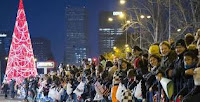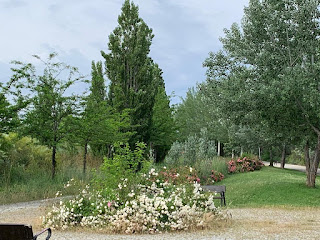En la dedicatoria de la segunda parte del Quijote el autor anuncia al conde de Lemos que el gran emperador de la China, 'pues en lengua chinesca habrá un mes que me escribió una carta ....porque quería fundar un colegio donde se leyese la lengua castellana, y quería que el libro que se leyese fuese el de la historia de Don Quijote.'
The appeal of Don Quijote is universal. In our family home we all loved the souvenirs my mother bought here in Spain of Don Quijote on horseback and by his side Sancho Panza on his donkey.
During confinement I decided to read the complete story to see if it stood up to the test of time. And it does. I really enjoyed escaping into the 16th and 17th century with Cervantes and his noble protagonists as they wander around looking for adventure and talking all the time.
A word of warning. If you read this magnificent book, have at hand some good manchego cheese and bread and maybe some wine.
DON QUIJOTE DE LA MANCHA
There are
fifty two chapters in Part One and seventy five chapters in Part Two. This
breaks it up nicely and it would be a wonderful thing to have weekly shared
readings at a library and hear the book read in the many accents of the Spanish
speaking world.
Each
chapter begins with an intriguing title
PRIMERA PARTE
Capítulo VIII. Del buen suceso que el valeroso don Quijote tuvo
en la espantable y jamás imaginada aventura de los molinos de viento, con otros
sucesos dignos de felice recordación
However one
simply states:
SEGUNDA
PARTE
Capítulo IX. Donde se cuenta lo que en él se verá.
DON QUIJOTE PART TWO
People in
the seventeenth century were anxiously awaiting a sequel to Part One of Don
Quijote De la Mancha. Its author Miguel de Cervantes Saavedra explains right from the start that this is
the authentic Part Two because other writers had jumped on the bandwagon and
other stories were circulating by the time this one reached print. Cervantes
weaves this very neatly into his story and tells us that our two heroes set out
for Zaragoza so that Don Quijote could participate in the jostling tournaments
there but they change their plans when our hero
discovers that the fake Don Quijote did exactly that. The authentic Don Quijote continues therefore
on to Barcelona and does not set foot in Zaragoza.
The fame of
the two travelling companions precedes them and soon they are actually the
guests of a duke and duchess. Here is
the scathing description of another guest at the duke’s palace on the arrival
of Don Quijote.
La duquesa y el duque salieron a la puerta de la
sala a recibirle, y con ellos un grave eclesiástico de estos que gobiernan las
casas de los príncipes; de estos que, como no nacen príncipes no aciertan a
enseñar cómo lo han de ser los que lo son; de estos que quieren que la grandeza
se mida con la estrechez de sus ánimos; de estos que queriendo mostrar a los
que ellos gobiernan a ser limitados les hacen ser miserables.
Later Don
Quijote dismisses the offense given him by the same clergyman saying,
Las armas de los togados son las mismas que las de
la mujer, que son la lengua.
Reading
Part Two is a voyage of discovery and a lesson in life but most of all it is a
celebration of true friendship.
Don Quijote enjoys the good company and
simplicity of Sancho Panza who delivers innumerable popular sayings much to his
master’s disbelief and irritation. Sancho genuinely admires and declares his
master’s bravery to all they meet. It is Sancho who names him Caballero de la
Triste Figura and after the amazing adventure with the lions changes the title
to Caballero de los Leones.
He learns
that a knight errant has to master many disciplines: mathematics, astrology,
laws of justice, theology, medicine especially herbal remedies, must know how
to swim, how to shoe a horse, must guard the faith and defend the honour of his damsel.
The duke and duchess play act and make fun of their two guests with the help of their servants.
Sancho governs the ‘island’ that he has been given by the Duke with simplicity and prudence but he lacks his master’s bravery. We will always find Sancho hiding up a tree or hiding behind the Duchess when trouble arrives and it is not long until he leaves his new life to find his master and continue on their ventures.
Sancho never ceases to be amazed at Don Quijote's knowledge and power with words, spinning
fantasies so that even his old friends the barber, the scholar and the cleric would all join him quite happily on his next proposed escapade which occurs to him quite suddenly after he resigns himself to laying down his arms. The new venture he proposes is to lead the life of a shepherd in the
mountains. He paints such a beautiful
idyllic picture of this life that the reader would happily join him too.
There are
too many stories to make a résumé. It is very very funny still.
Here are
some quotes from the first and most important novel ever written.
EL INGENIOSO HIDALGO DON
QUIJOTE DE LA MANCHA
Los montes crían
letrados y las cabañas de los pastores encierran filósofos.
El clérigo
Dios bendijo la
paz y maldijo las riñas.
Sancho
Con facilidad se
piensa y se acomete una empresa; pero con dificultad las más veces se sale de
ella.
Sansón Carrasco
La pluma es la
lengua del alma.
Don Quijote
¿Leoncitos a mí?
A mí leoncitos, y a tales horas?
Don Quijote
...porque lo que hablaba era concertado y elegante y bien dicho, y lo que hacía, disparatado, temerario,y tonto.
Diego de Miranda Caballero de la Mancha
La mejor salsa del mundo es el hambre
Don Quijote
Sobre un buen
cimiento se puede levantar un edificio y el mejor cimiento y zanja del mundo es
el dinero.
Sancho
….flor y nata y
espuma de los caballeros andantes!¡Allá vas, valentón del mundo, corazón de
acero, brazos de bronce!
Sancho
¿Qué importa?
Todo es morir, y acabóse la obra.
Don Quijote
Donde hay música
no puede haber cosa mala.
La música siempre
es indicio de regocijos y de fiestas.
Sancho
Me parece duro hacer esclavos lo que Dios y Naturaleza hizo libres.
Don Quijote
Consejos de Don Quijote a Sancho Panza para
gobernar su ínsula
Procura descubrir
la verdad entre las promesas y dádivas del rico como por entre los sollozos e
importunidades del pobre.
….más resplandece
y campea a nuestro ver el (atributo) de la misericordia que el de la Justicia.
Anda despacio;
habla con reposo.
Come poco y cena
más poco, que la salud de todo el cuerpo se fragua en la oficina del estómago.
Él que no madruga
con el sol no goza del día.
Más sabe el necio
en su casa que el cuerdo en la ajena.
Siempre favorece
el Cielo los buenos deseos.
Sancho responde
…que yo no sé más
de gobiernos de ínsulas que un buitre; y si imagina que por ser gobernador me
ha de llevar el diablo, más me quiero ir Sancho al cielo que gobernador al
infierno.
Don Quijote le responde
Por sólo estas
últimas razones que has dicho juzgo que mereces ser gobernador de mil ínsulas.
En las galeras en Barcelona
Estas sí son verdaderamente cosas encantadas, y no las que mi amo dice.
¿Qué han hecho estos desdichados que ansí los azotan y cómo este hombre sólo,
que andar por aquí silbando, tiene
atrevimiento para azotar a tanta gente? Ahora yo digo que esto es infierno, o,
por lo menos, el purgatorio.
Sancho
…. he oído decir
que esta que llaman por ahí Fortuna es una mujer borracha y antojadiza, y sobre
todo ciega, y así, no ve lo que hace ni
sabe a quién derriba, ni a quién ensalza.
Sancho
Muy filósofo
estás Sancho.
Muy a lo discreto
hablas: no sé quién te lo enseña. Lo que te sé decir es que no hay Fortuna en
el mundo…..que cada uno es artífice de su ventura.
Don Quijote
¿Qué tienen que ver los Panzas con los Quijotes?
Sancho
'Para mí sola nació Don Quijote y yo para él.'
Cervantes (Cide Hamete el prudentísimo autor del cuento.)























































